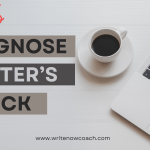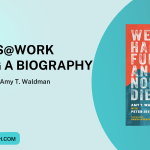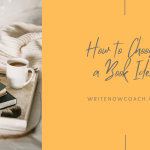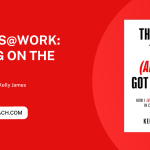Writers@Work: An Interview with Literary Agent Mark Gottlieb
January 10, 2017
Note From Rochelle
Dear Writers,
Greetings! This week I’ll be making some major changes to my website. If you need to contact me to schedule a session or talk about joining one of our coaching groups, please email me at: rochelle@writenowcoach.com
Today I’m delighted to welcome Literary Agent Mark Gottlieb to the blog to talk about publishing, platform, and query letters. If you’re wondering how to break into traditional publishing, then read on. This article will help you move forward quickly.
Happy Writing!
Rochelle, the Write Now! Coach
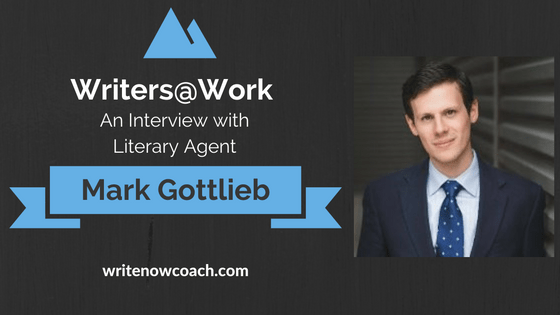
Writers@Work: An Interview with
Literary Agent Mark Gottlieb
By Rochelle Melander
What kinds of authors do you represent?
Every literary agent is different. I happen to represent a few dozen authors or so, but they are all at different points in their careers. Some of those clients might write a book a year like with a continuing series, while others might write a book every five or ten years. With other clients, they might just write one book their entire life!
There are some agents that like to be known solely for representing one genre or type of author. I prefer to have a lot of different irons in the fire at once, working on projects and various genres that interest me, rather than placing all my chips in one basket. With that being said, my list tends to skew more toward SFF and graphic novels, and I happen to rank #1 on Publishers Marketplace in deals for those categories. I also do a lot of mystery/crime/thriller, as well as some women’s fiction, general fiction, creative nonfiction, pop culture, humor, celebrity memoir, picture books, YA, MG, children’s fantasy and various other nonfiction categories. I’m open to receiving more clients.
What makes a manuscript stand out for you?
An ideal project would carry an important social message or moral to the story, and while not only being beautifully written, it should be accessible or have some aspects of commercialism to the writing, even if it is literary fiction. I also look for authors that have good writing credentials such as experience with writing workshops, conferences, or smaller publications in respected literary magazines. Having awards, bestseller status, a strong online presence/platform, or pre-publication blurbs in-hand for one’s manuscript is also very promising in the eyes of a literary agent.
A manuscript that recently spoke to me that I decided to take on, and subsequently sold to a publisher, is World Fantasy Award-nominated author Christopher Brown’s TROPIC OF KANSAS. Description: on the front lines of a revolution whose fuse they are about to light, a fugitive brother and sister are harboring explosive government secrets; pitched as a novel of political dissent akin to the Americana of THE ROAD, the brave new corporate world of JENNIFER GOVERNMENT, or a post-9/11 MAN IN THE HIGH CASTLE; the story of ordinary people seeking to refresh democracy in a mirror America ruled by a telegenic dictator of a businessman. The famed and award-winning editor David G. Hartwell of Tor Books had bought the book in his very last book deal, but suddenly passed away in a terrible freak accident. We were able to move the project over to David Pomerico of Harper Voyager where the project now happily resides and is slated for publication in 2017.
What initially drew me to the project was that the author not only had a lot of “street cred” as an award-nominated author and short story writer—he had already collected pre-publication blurbs from William Gibson, Bruce Sterling, and Cory Doctorow, as well as trade reviews from Locus, Boing Boing, Tangent, and many other trade review sites and notable authors. Christopher had also tapped into the heart of near-future sci-fi with an important social message—a hot topic for right now in SF.
Christopher’s writing focuses on issues at the nexus of technology, politics, and economics and often fit within the literary subgenre sometimes denominated avant-pop—”pulp fiction for smart people,” in the words of the author, answering questions such as “Whatever happened to the guest appearance of Jorge Luis Borges on The Love Boat?” or “What if Beltway psychological warfare operatives co-opted Saddam’s Frazetta-dealer?”
Harper Voyager has also compared TROPIC OF KANSAS to READY PLAYER ONE, STATION ELEVEN and HIGH-RISE.
As authors, we hear a lot about building our platform. What do you look for when assessing an author’s platform?
I’m finding that the importance of platform in author’s career has also made its way into the world of fiction, to an extent. In looking for an ideal fiction client with a platform, I look for authors that have good writing credentials such as experience with writing workshops, conferences, or smaller publications in respected literary magazines. Having awards, bestseller status, a strong online presence, or pre-publication blurbs in-hand for one’s manuscript is also very promising in the eyes of a literary agent.
Platform is even more important in considering nonfiction authors. It is not enough for an author of nonfiction to be a respected authority on their subject matter—it’s important to publishers to know that such authors have a big online presence or social media following. That’s why selling celebrity fiction to publishers is almost a no-brainer. Publishers get this strange thought in their minds that if any given celebrity has 100,000 followers or more, if even just ten percent of those followers buy the book, then the publisher is already in good shape.
An author having only small blog coverage of their work and/or a small social media following won’t be as problematic to fiction as it might be to a work of non-fiction. An author might compensate by trying to beef up their social media following, improve upon their author website, do more blog outreach for review/interview attention, appeal to established authors for pre-publication blurbs, etc.
Beyond what a publisher or a literary agent can do in marketing/promoting and author, it is important for an author to understand that they are very central to this process, since ultimately readers will want to hear directly from the author when possible. I encourage clients to build author websites, blogs and to beef up their social media presence, via sites such as Twitter, Facebook, Instagram, Goodreads, Reddit Author AMAs, etc. Performing readings/signing, speaking at conferences/workshops and reaching out to local publications and libraries is key, as is appealing to highly established authors for advance praise. Writing to online blogs/podcasts/YouTube channels, etc. for review/interview attention is also very good. Sometimes I might even recommend a book publicity firm to a client, but that can cost a couple thousand dollars/month in the few months leading up to publication. Ultimately, there’s no small drop in the bucket, since everything an author puts into marketing/promo, they will get back in sales of their book, especially if the book falls into the right hands of a major publication, celebrity or film/TV company, which can be marketing gold.
I’ve heard that some agents are editorial and other agents prefer to manage the deals. What sort of an agent are you?
If interested in a manuscript, I tend to offer representation upfront, with the expectation that an author will remain open to editorial discussion, if need be. Every manuscript is different; I have read manuscripts that read very tightly and needed few if any editorial comments from me. In those instances I might provide just a few bulleted points or so for the author to keep in mind. In other instances I have written ten or twelve-page editorial letters. While that may seem like overkill, it expresses my firm belief in an author’s career growth.
What advice do you have for authors who are hoping to pitch to you?
My advice to authors along the querying process is to really nail the writing of that query letter. A query letter that reads well is usually a good indication to the literary agent that the manuscript will similarly read well, inclining the literary agent to request a manuscript. Oftentimes the query letter can go on to become the publisher’s jacket copy, were the publisher to acquire the manuscript via the literary agent.
A good query letter is: upfront in one-two sentences what the book is about in hook or elevator pitch fashion (should mention the title, lend a sense of genre, and contain one-three competitive/comparative titles that were bestsellers or award-winners, published within the last few years). If the author has pre-publication blurbs, those can appear before those first two sentences. Next is a couple of body paragraphs detailing some of the plot details without too many spoilers and in that space the literary merits of the manuscript can be mentioned. The last paragraph is usually reserved for a short author bio, mentioning relevant writing experience/credentials, and a link to an author site or social media page(s) can be included there.
There are many mistakes that I’ve seen in query letters, but I will name just a few that would absolutely deter me from requesting the manuscript from an author:
-Submitting queries for novellas, short story collections, poetry or textbooks will usually turn a literary agent off, as most literary agents do not represent such things. Publishers tend not to buy from literary agents in those areas in the first place.
-Word count is also very important. Traditional book length is 80-120K, and commercial fiction tends to be in the 80-90K-word range. Going outside of normal book-length will not produce good results for an author querying a literary agent for a shot at going into major trade publishing.
-Writing within struggling genres such as cozy mysteries, erotica, or urban fantasy is also another way to turn a literary agent off in the querying process. We tend to be weary of that at Trident Media Group.
In terms of manuscripts:
In the case of literary fiction, lending some accessibility is what I find to be important. The literary community as a whole tends to be very insular and the books themselves also read like they’re too cool for school. Uncompromising literary fiction often contains prose that are more concerned with being stylish and flowery, thereby torturing the narrative and losing the reader in the poetics. A piece of advice I tend to share with clients in such a pitfall is a famed quote from the author Charles Bukowski: “An intellectual says a simple thing in a hard way. An artist says a hard thing in a simple way.” That will help the moral of the book shine through, which is ultimately what attracts me to a manuscript, since many of the books I represent are concerned with important social messages.
For genre fiction and commercial fiction, it is important to be aware of the genre conventions and tropes, in order to either generally avoid them, or spin them in a new and interesting way. For instance, I find it the strangest thing that in most every zombie novel, the protagonist wakes up in a hospital bed from a coma, to suddenly realize they’re in a world full of zombies. I’m sure that was a neat trope when it started out, since the motif of dreaming/waking kind of plays with the zombie theme in reverse (our protagonist wakes from the world of the living to the dead, whereas his antagonists have fallen asleep from the world of the living to a dream-like state in the world of the dead). Nowadays that trope is just old hat to most readers of zombie books.
Is there anything specific you’re looking for right now?
As mentioned earlier in the interview, I represent quite a mixture of authors and I am quite open to most anything excluding poetry, novellas, short story collections and textbooks. Similarly, the market is particularly soft to horror, urban fantasy, soft sci-fi, high fantasy, erotica, cozy mysteries, and paranormal romance. So I am not really open to struggling genres.
The bulk of my list is comprised of science fiction, fantasy, graphic novels, literary fiction, mystery, crime, thrillers, women’s fiction, romance, young adult, middle grade and picture books. I also do a lot of creative nonfiction, pop culture, celebrity memoir and humor. I would like to do some more serious nonfiction, and I am always on the look out for commercial fiction and a great literary author making their major debut.
 About the Author
About the Author
Mark Gottlieb attended Emerson College and was President of its Publishing Club, establishing the Wilde Press. After graduating with a degree in writing, literature & publishing, he began his career with Penguin’s VP. Mark’s first position at Publishers Marketplace’s #1-ranked literary agency, Trident Media Group, was in foreign rights. Mark was EA to Trident’s Chairman and ran the Audio Department. Mark is currently working with his own client list, helping to manage and grow author careers with the unique resources available to Trident. He has ranked #1 among Literary Agents on publishersmarketplace.com in Overall Deals and other categories.
 Write Now! Coach Rochelle Melander is an author, a certified professional coach, and a popular speaker. Melander has written ten books including Write-A-Thon: Write Your Book in 26 Days (And Live to Tell About It). As the Write Now! Coach, she teaches professionals how to write books fast, get published, and connect with readers through social media. Get your free subscription to her Write Now! Tips Ezine at https://www.writenowcoach.com.
Write Now! Coach Rochelle Melander is an author, a certified professional coach, and a popular speaker. Melander has written ten books including Write-A-Thon: Write Your Book in 26 Days (And Live to Tell About It). As the Write Now! Coach, she teaches professionals how to write books fast, get published, and connect with readers through social media. Get your free subscription to her Write Now! Tips Ezine at https://www.writenowcoach.com.



